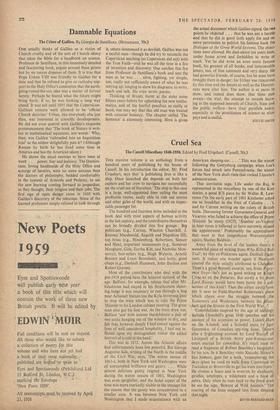Damnable Equations
The Crime of Galileo. By Giorgio de Sa ntillana. (Heinemann, 30s.)
ONE usually thinks of Galileo as a victim of Church cruelty and of the sort of Church idiocy that takes the Bible for a handbook on science. Professor de Santillana, in this immensely detailed and fascinating book, argues around these points but by no means disposes of them. It is'true that Pope Urban VIII was friendly to Galileo for a time and that he refused to give ex cathedra sup- port to the Holy Office's contention that the earth- gbing-round-the-sun idea was a matter Of formal heresy. Perhaps he feared what the future might -bring forth; if so, he was looking a long way ahead. 'It was not until 1893 that the Copernican- Galilean systems were allowed to be 'official Church doctrine.' Urban, like everybody else just then, was interested in scientific developments. He did not even quarrel with Galileo's exquisite pronouncement' that `The book of Nature is writ- ten in mathematical equationS, not -words.' Why, then, was Galileo 'railroaded into an Inquisition trial' as the author delightfully puts it? (Although Roman by birth he has lived some time in America and has the American idiom.)
He shows the usual enemies to have been at work . . . power, fear and jealousy. The Dothini- cans, loving handmaids of the Holy Office and scourge of heretics, were no more anxious than the doctors of philosophy, bedded comfortably in the systetris of Aristotle and Ptolemy, to see the new learning coming forward to jeopardise, as they thought, their religion and their jobs. The first sign of open danger came in 1610 with Galileo's discovery of the telescope. Sbme Of the learned professors Simply refused t6 lOok through it, others denounced it as devilish. Galileo was not a tactful man—though he did try to reconcile the Copernican teaching (as Copernicus did not) with the True Faith—and he was all the time in a fire of invention and discovery. One catches this fire from Professor de Santillana's book and sees the man as he was . . . alive, fighting, yet simple, too, really not sufficiently aware of what he was stirring up; longing to show his diagrams, to write, teach and talk. He even wrote poems.
Thinking of Brunb, burnt at the stake some fifteen years before for upholding the new mathe- matics, and of the fearful penalties so' easily at hand, one may say that this old man was treated with unusual leniency. The chapter called 'The Sentence' is extremely interesting. Here is given
the actual document which Galileo signed. On two points he objected . . . that he was not a heretic and that he did in good faith apply for and re- ceive permission to publish his famous book the Dialogue of the Great World Systems, The objec- tions were allowed. He died about ten years later, under house arrest and forbidden to write or teach. Yet he did write an even more famous book, his greatest of all books, and innumerable letters, too, of free comment and very sharp. He had powerful friends, of course, but he must have brought them in danger; for Urban was rancorous by this time and the Jesuits as well as the Domini- cans were after him. The author is at pains to show, and indeed does show, that these past events—the trial, the attempt to muzzle learn- ing in the supposed interests of Church, State and the public welfare—:have their parallels today, especially in the prostitution of science to what pays and is useful.
STEVIE SMITH


































 Previous page
Previous page